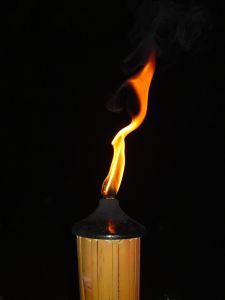Trust Da Man

For a month last year, my Medic Mate lived in my flat, and it was lovely. We had paella; we went on adventures on her one-day-off-every-two-weeks, we consumed obscene quantities of peas; and in the evening, she’d tell me about work.
“The nurses!” she exclaimed. “Oh but, you know what, as well as the nurses: the midwives. If one more midwife tells me to intubate a perfectly happy baby…”
I was at a quiet patch, in writing terms, and so doubly enjoyed listening to her as she staggered home from another day at the hospital, lamenting tales of fools and bumbling medics, of dodgy decisions and hopeful judgments made on the ward. In many ways, a great deal of the (always anonymised) stuff she said gave me great faith in the NHS, and served as a reminder of how passionate many physicians are, and how hard they work, and how deeply they care.
However, just as interesting, were the tales of everyday, casual incompetence. Of gentle laziness and office politics; of power plays and dodged responsibilities, of, in short, very human attributes. Listening to it all, there was nothing remarkable there, but rather a reminder of how fallible human beings are, including those just bumbling by in large and noble organisations.
It’s not a new thought, it’s not particularly remarkable. But it has somewhat redefined my view towards ‘professionals’ whenever they enter my universe. It’s a well known fact that everything you hear on the news is true: except the 5% you actually know about. For example, I will fairly regularly see a bio of myself at events or talks I go to, and 99% of the time there’ll be something in it, which is simply wrong. Plain wrong. And that’s fine – it’s kinda funny, in fact, and I almost always let it stand – but the consistency of this event does lead me to wonder whether the whole world, isn’t in fact swimming in gentle, polite inaccuracy.
“There’s not much point sending you for a test,” said my GP, “Because the results never show anything.”
Usually, I accept this. Meekly in the face of Knowledge and Experience, I curl up into a ball of ignorance, and nod and smile and say, “Okay, if you think so…”
Or:
“Of course the stage is this wide!” exclaims the Production Manager. “I measured it!”
“Okay,” I reply, a polite and professional lighting designer to the bone. “It looked bigger when I was actually in the venue, but if you’re certain…”
In many ways, my response is very English. I don’t want to challenge authority and find that I’m wrong; I don’t want to be the ignorant loon who rocks that boat. After all, surely then all these Important People will think less of me, when it turns out that I’m inevitably mistaken? That said, the side-effect of this terror is an inevitable switching off of higher faculties. Every fibre of my intellect screams, ‘doctor doctor there’s something wrong with my body now test me!’ but as the GP, talking to me down the telephone, a man who’s never even met me, declares, ‘there’s no point testing’ I simply accept another man’s authority over my own self-knowledge. How ridiculous, I muse, that a stranger on the other end of the phone should so easily trump my own sense data? And though looking at a stage I can see, with my own two eyes, that I’m right, and the person with the tape measure is wrong, who am I to question their wisdom? No one, really. My expertise lies elsewhere.
Putting your trust in professionals is a good and sensible thing. I trust my agent, I trust my publisher, I trust (and often love) my stage manager for being good and right and on it and generally saving my bacon. I trust my GP; I trust the police force when they knock on my door. Because at the end of the day, they are committed to a career and have access to knowledge that I do not, and I’d be an idiot not to trust them.
The police are an interesting, and frequently controversial example. Do I trust my local copper? Yes. Because if I’m in trouble, I genuinely believe that the police will come to my assistance, and without this society would flounder. I believe in law; I believe in justice. Do I believe both of these are always upheld? No. Do I have a better idea for how to uphold them? No. And so I trust, as it were, from necessity.
Do I trust the Met Police as an institution? Perhaps, but with caveats that institutions breed institutionalism, and the needs of an individual can be swallowed whole. Like the NHS, the Met is full of people. Good people, lazy people, dedicated people, useless people, kind people, flawed people.
Do I trust my GP, as he attempts (how I LOATHE OUR GOVERNMENT) to diagnose me over the phone? If my doctor tells me I am imagining it, I would stop to consider this opinion, because at the end of the day, he’s probably got a basis for it. But now, I would also stop to question his view, and at long last, I feel like I’m finally overcoming enough of my fear of The Expert to ask: why?
Why will this case not be prosecuted? Why is there no point sending me for a test?
In medicine in particular, we’re often so frightened of that most terrifying of scenarios – something being wrong with ourselves or our loved ones – that we go quiet. Cause no trouble, tread soft, because at the end of the day, if something were to happen, the only thing worse than the medical consequences themselves, would be knowing that we, through our actions and our ignorance, made it worse. And so we accept, for fear of the alternative.
But now I think there is a balance to be struck, and I suspect that genuine, skilled experts have no problem with it. (‘I’ll have more respect for you asking questions and getting it right, than not asking questions and getting it wrong,’ was a regular mantra of our RADA training, as well as an unspoken rule of working at the National Theatre…)
Questioning, inquiring, pushing for answers: these are not signs of mistrust. It is not offensive to ask questions that are pertinent to your wellbeing, nor is it an insult to request a second opinion in the name of gathering information. I would never assume I knew more than an expert about what drugs to prescribe or the nature of a massively obscure problem. But there is a difference between trusting someone, and just letting your mind go blank.





